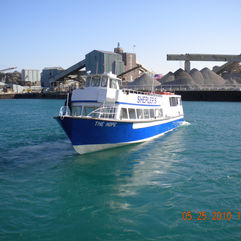

PAST PERFORMANCE

OWNER
LOCATION
HULL
DIMENSIONS
WEIGHT
SPEED
CAPACITY
MAIN PROPULSION
DURATION
OTHER
Shepler's Mackinac Island Ferry
Mackinaw City, MI - For operation in the Straits of Mackinac, MI
Aluminum
85' L x 22' B x 9' D
68 Tons
40 mph
281 Passengers
Three 2000 HP
December 2014 - September 2015
Classed USCG - Title 46 Chapter I Subchapter K: Small Passenger Vessels Carrying More Than 150 Passengers
Moran Iron Works was awarded the contract to construct a high speed aluminum passenger vessel to operate in the Straits of Mackinac. The MISS MARGY is a K Class passenger vessel built in accordance with U.S. Coast Guard regulations. Moran worked with SeaCraft Design, a naval architecture and design firm based in Sturgeon Bay, Wisconsin, for the vessel design.
The vessel was launched at Port Calcite in late May 2015. It was taken to its homeport in Mackinaw City where final cosmetic touches have been applied. The vessel was christened in July 2015 and underwent final sea trials prior to its formal addition to the fleet in late September 2015.
CONSTRUCTION OF A HIGH SPEED ALUMINUM PASSENGER FERRY
MISS MARGY
OWNER
LOCATION
MATERIAL
DIMENSIONS
WEIGHT
DURATION
OTHER
Shepler's Mackinac Island Ferry
For operation in the Straits of Mackinac, MI
Steel
91' L x 36' B x 10' D
160 tons
February 2013 - May 2013
Classed USCG - Title 46 CFR Chapter I Subchapter T: Small Passenger Vessels
Moran Iron Works performed a major vessel modification and repowering on Shepler’s Mackinac Island Ferry’s SACRE BLEU in early 2013. The SACRE BLEU was constructed in 1959 as a 65’ steel monohull ferry. In 1986, the vessel had an additional 30’ added to the center span to increase capacity. In February 2013, Moran Iron Works was contracted by Shepler’s and began a major vessel modification and repower project on the vessel. The scope of work included extensive updates to the bow design as well as hull and deck strengthening reinforcements for increased durability, specifically for the purpose of allowing for an extended navigating season through ice-to-ice operational capabilities. In addition, a full fixed CO2 fire suppression system was installed.
The vessel was hauled out at Port Calcite where the forward section of the vessel was removed as was most of the deck plating, leaving the aft and mid sections, the original deck-level pilot house, and internal framing still intact. A new redesigned 25’ bow section was fabricated at our main fabrication shop in Onaway, as was a 47’ fully-equipped pilot house and passenger cabin. Both the new bow section and the pilot house were transported to the Port Calcite facility where they, along with the new heavier deck plating, were attached to what remained of original vessel. Work was completed, and the SACRE BLEU was delivered in early May, in time for the 2013 season.
SACRE BLEU
PASSENGER FERRY REPOWER AND MODIFICATIONS
OWNER
LOCATION
MATERIAL
DIMENSIONS
DURATION
Shepler's Mackinac Island Ferry
Mackinaw City, MI - For operation in the Straits of Mackinac, MI
Aluminum
87' L x 18' B x 8' D
November 2009 - May 2010
In 2009, Moran Iron Works performed a vessel overhaul and a mid body extension on Shepler’s Mackinac Island Ferry’s THE HOPE. In November 2009, the 69’ aluminum monohull ferry was hauled out at Port Calcite and trucked to the main fabrication shop in Onaway. A 17’ aft portion of the vessel was removed and discarded, and a new 35’ section was fabricated in the shop and attached to the existing aluminum hull. The completed vessel is 87’ long with an 18’ beam.
During the fabrication process, other integrated systems were either installed or upgraded. Most significantly, the vessel was repowered with two new 1410 HP MTU 16V engines. In the process, the fuel tanks were relocated for improved stability after the extension of the vessel’s hull. The existing deck was also reinforced with new steel deck plating. State-of-the-art custom exhaust and electronic monitoring systems were installed as were new onboard systems for navigation, AC and DC power, potable water, heating, communications, and lighting. In addition, a full fixed CO2 fire suppression system was installed. The overall project increased the vessel’s capacity as well as extended its life and capabilities. The work was completed and the vessel was delivered in May 2010 in time for the navigating season.
PASSENGER FERRY LENGTHENING AND OVERHAUL
THE HOPE
















